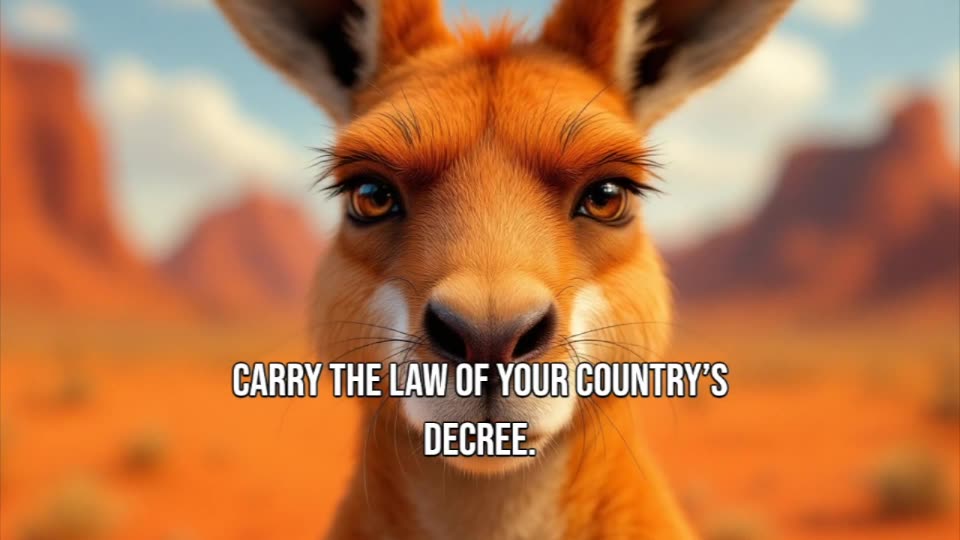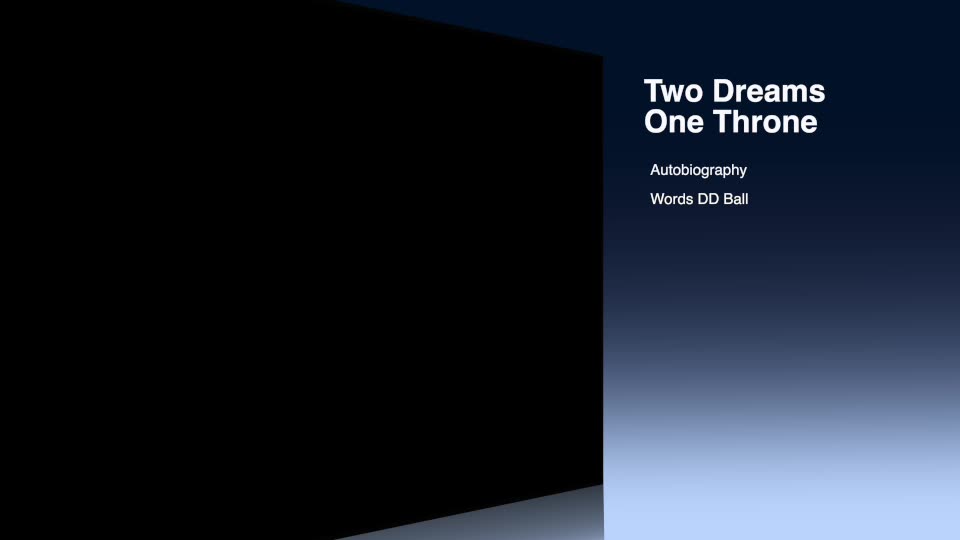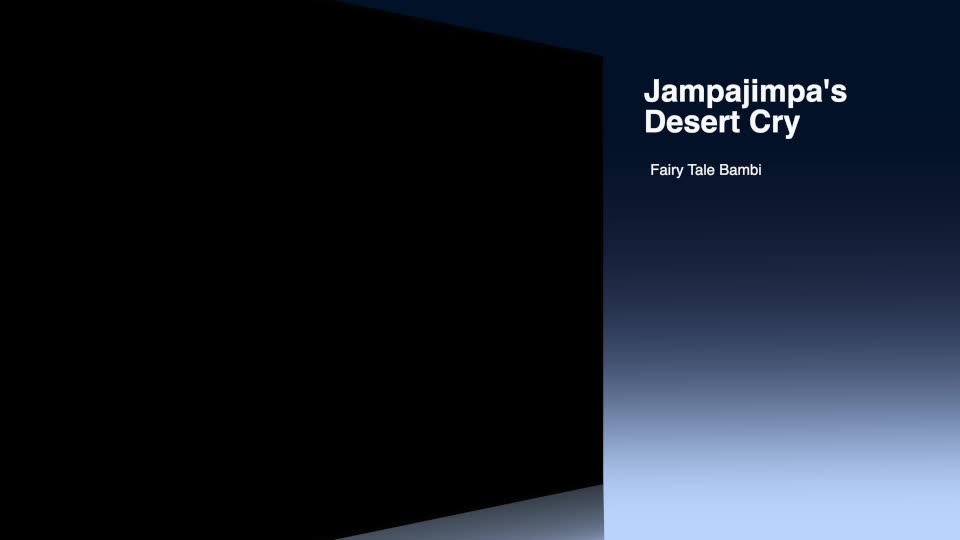

In Tanami’s red sands where spinifex grows,
Where waterholes gleam ‘neath the sun’s golden glare,
Lived Yaparla, sweet maid, with a heart pure as snow,
Her kindness a light in the desert so bare.
Her father, a wise man, kept songs for the land,
To guard the soak’s waters where life held its sway.
But drought gripped the earth with a merciless hand,
And he sought a new spring to ease their dismay.
Deep in a gorge where the rocks hid the sky,
He found a clear pool with fish dancing free.
But a voice shook the stones with a thunderous cry,
“Who steals my sweet water without leave of me?”
Out slid the Wanyarra, half-man, half a snake,
His scales flashed like opals, his eyes cold with pain.
“For your kin’s life,” he hissed, “one price I must take—
Send Yaparla to me, or your land drinks no rain.”
The father returned, his heart heavy with woe,
And told his dear daughter the serpent’s demand.
“I’ll go,” said Yaparla, her voice soft and low,
“For my people, my country, I’ll walk that red sand.”
She came to the gorge with her digging stick strong,
Singing songs of her kin ‘neath the stars’ silver gleam.
The Wanyarra watched silent, his shadow so long,
Yet she saw in his gaze a lost wanderer’s dream.
Each day she tended the waterhole’s grace,
Cleared reeds, sang to fish, kept the life-flowing tide.
He brought her bush fruits, left them soft in her place,
And slowly her fear of the serpent-man died.
One night by the fire, ‘neath the Milky Way’s arc,
She asked, “Why, Wanyarra, do you dwell here alone?”
He spoke of his curse, how greed shadowed his spark,
Turned man into beast, bound to water and stone.
“Only love,” said he, “seeing truth past my form,
Can free this old spirit from chains of the past.”
Yaparla’s heart warmed like the desert at morn,
And her care for his soul grew both tender and fast.
But homesickness called her to family and kin,
Her laughter grew faint, and her eyes dimmed with care.
“Go home,” said Wanyarra, “but come back again,
For seven days hence, or my life fades to air.”
She ran to her people, their arms open wide,
But sisters, with envy, said, “Stay, you are free.”
She lingered till dreams showed her serpent beside,
His scales dull, his spirit near lost to the sea.
Through spinifex sharp, Yaparla raced to the spring,
Found Wanyarra fading, his breath weak and slow.
“I see you,” she wept, “not your scales, but your spring,
Your heart guards this land, and my love makes it so.”
The waterhole glowed with a radiant light,
The Rainbow’s own voice sang of curses undone.
Wanyarra arose, a man strong in her sight,
His eyes deep as deserts where new rivers run.
To her people they went, hand in hand, ever near,
And the waterhole’s life through the Tanami spread.
Now Warlpiri sing of sweet Yaparla’s care,
Whose love freed a man where a serpent once tread.
Notes on the Ballad
Structure: The ballad uses quatrains with an ABCB rhyme scheme, common in English folk ballads like “Barbara Allen” or “The Daemon Lover.” The meter is loosely iambic, alternating between tetrameter and trimeter, giving a singable, storytelling rhythm.
Tone and Imagery: The language evokes the Tanami Desert—red sands, spinifex, waterholes—while maintaining the romantic and mystical tone of English ballads. Phrases like “scales flashed like opals” and “Milky Way’s arc” blend Warlpiri cosmology with poetic flourish.
Cultural Sensitivity: The ballad retains Warlpiri values (kinship, care for country, transformation) and avoids sacred or restricted elements. Yaparla’s agency and connection to the land are central, reflecting Warlpiri gender roles in storytelling. Wanyarra’s curse aligns with Dreamtime themes of ancestral beings needing redemption.
Adaptation: The narrative simplifies some details (e.g., the sisters’ jealousy is condensed) to fit the ballad’s concise form but keeps the core arc of sacrifice, love, and healing. The Rainbow Serpent’s role is subtle, nodding to Warlpiri spirituality without overstepping cultural bounds.
Singability: The ballad is designed to be sung, with repetitive imagery (water, desert, heart) and a refrain-like quality in the final stanza, mirroring Seeger or Guthrie’s folk style.
This ballad could be performed with a simple banjo or guitar accompaniment, in the spirit of Pete Seeger or Woody Guthrie, to honor their folk traditions while telling a Warlpiri-inspired tale. If you’d like a melody suggestion, a recording, or adjustments (e.g., shorter verses), let me know!
Pete Seeger (May 3, 1919 – January 27, 2014) was an American folk singer, songwriter, and activist whose music and advocacy profoundly shaped the 20th-century American folk revival and social justice movements. Known for his banjo playing, clear tenor voice, and commitment to causes like civil rights, labor rights, environmentalism, and peace, Seeger used music as a tool for community building and change. Below is an overview of his life, career, and legacy, with connections to Woody Guthrie, given your previous question.
Early Life and Musical Beginnings
Born in New York City to a musical family, Seeger was the son of Charles Seeger, a musicologist, and Constance de Clyver Edson, a violinist. Raised in a progressive, intellectual environment, he developed an early interest in folk music, inspired by American traditions and the idea of music as a democratic force. At 16, he heard the five-string banjo at a folk festival in North Carolina, an encounter that shaped his musical path. He briefly attended Harvard but dropped out in 1938, choosing to travel the U.S., collect folk songs, and learn from ordinary people.
In 1940, Seeger met Woody Guthrie, a pivotal influence. The two shared a passion for music that spoke to the working class and joined the Almanac Singers, a folk group that performed pro-union and anti-fascist songs during the early 1940s. Seeger admired Guthrie’s raw, poetic style and adopted his approach of using music to address social issues. Their friendship endured, with Seeger visiting Guthrie during his final years in hospitals as Guthrie battled Huntington’s disease.
Musical Career and The Weavers
Seeger’s career spanned seven decades, marked by both solo work and collaborations. In the 1940s, he co-founded the Almanac Singers with Guthrie and others, singing songs like “Union Maid” and “Talking Union” to support labor movements. The group’s left-leaning politics drew scrutiny during World War II, but their music laid the groundwork for the folk revival.
In 1948, Seeger formed The Weavers with Lee Hays, Ronnie Gilbert, and Fred Hellerman. The quartet brought folk music to mainstream audiences with polished harmonies and hits like “Goodnight, Irene” (a Lead Belly song, 1950) and “Kisses Sweeter Than Wine.” Their version of “Wimoweh” (later “The Lion Sleeps Tonight”) introduced African folk to American listeners. The Weavers’ success was cut short by the Red Scare; Seeger’s leftist affiliations led to blacklisting, and the group disbanded in 1952, though they reunited periodically.
As a solo artist, Seeger recorded extensively, releasing albums like American Folk Songs for Children (1953) and Darling Corey (1950). He popularized songs like “If I Had a Hammer” (co-written with Lee Hays), “Where Have All the Flowers Gone?,” and “Turn! Turn! Turn!,” often adapting traditional melodies to address contemporary issues. His banjo, inscribed with “This machine surrounds hate and forces it to surrender,” became an iconic symbol of his activism.
Activism and Social Impact
Seeger’s music was inseparable from his activism. He saw songs as tools to unite people and inspire action. Key areas of his advocacy included:
Labor and Civil Rights: In the 1930s and 1940s, Seeger supported unions, performing at strikes and rallies. During the Civil Rights Movement, he popularized “We Shall Overcome,” adapting it from a gospel hymn. He marched with Dr. Martin Luther King Jr. and performed at integrated events, defying segregation laws.
Environmentalism: In the 1960s, Seeger co-founded the Clearwater organization to clean up the polluted Hudson River. He built the sloop Clearwater, a floating classroom, and performed at festivals to raise awareness, contributing to the river’s restoration.
Anti-War and Peace: Seeger opposed the Vietnam War, writing songs like “Waist Deep in the Big Muddy” (1967), a veiled critique of U.S. policy. He faced censorship but remained outspoken against militarism.
Anti-McCarthyism: During the 1950s Red Scare, Seeger was subpoenaed by the House Un-American Activities Committee (HUAC) in 1955 for his Communist Party ties in the 1930s. Refusing to invoke the Fifth Amendment or name names, he cited the First Amendment, saying, “I am not going to answer any questions as to my association, my philosophical or religious beliefs or my political beliefs.” Convicted of contempt of Congress in 1961, he faced a potential 10-year sentence, but the conviction was overturned in 1962. The blacklist limited his career, but he performed at colleges and small venues, sustaining the folk revival.
Seeger’s approach was inclusive, encouraging audiences to sing along, which fostered a sense of shared purpose. His songbooks, like The Bells of Rhymney (1958), taught others to play folk music, democratizing the tradition.
Connection to Woody Guthrie
Seeger and Guthrie’s relationship was foundational to the folk movement. They met in 1940 at a migrant workers’ benefit concert, where Guthrie’s authenticity inspired Seeger. As Almanac Singers, they traveled together, sharing songs and ideals. Seeger later helped preserve Guthrie’s legacy, performing his songs with The Weavers and organizing benefits for Guthrie’s family during his illness. Seeger visited Guthrie in hospitals, bringing his banjo to play for him, and supported Marjorie Guthrie’s efforts to raise Huntington’s disease awareness. Seeger’s polished style contrasted with Guthrie’s rawness, but both shared a commitment to music as a voice for the marginalized.
Later Years and Legacy
In his later years, Seeger remained active, performing into his 90s. He sang at President Barack Obama’s 2009 inauguration with Bruce Springsteen, performing Guthrie’s “This Land Is Your Land” (including its rarely sung protest verses). He continued environmental work with Clearwater and supported Occupy Wall Street in 2011, marching in New York at age 92. His final public performance was in 2013 at a Clearwater benefit.
Seeger died on January 27, 2014, at 94, in New York City, from natural causes. His wife, Toshi-Aline Ohta Seeger, a filmmaker and collaborator who managed his career, had died in 2013. They had three children: Daniel, Mika, and Tinya.
Seeger’s legacy is immense. He influenced generations of musicians, from Bob Dylan and Joan Baez to Springsteen and Tracy Chapman. His songs became anthems for justice, and his environmental efforts helped clean the Hudson. Awards included the National Medal of Arts (1994), Kennedy Center Honors (1994), and multiple Grammys, including a Lifetime Achievement Award (1993). The Woody Guthrie Center and Smithsonian Folkways Recordings preserve his work alongside Guthrie’s.
Personal Traits and Philosophy
Seeger was known for his humility, optimism, and tireless energy. He lived simply, chopping wood at his Beacon, New York, home and avoiding commercialism. His philosophy, rooted in the belief that “the world will be saved by people fighting for their homes,” emphasized grassroots action. He often said, “The key to the future of the world is finding the optimistic stories and letting them be known,” reflecting his faith in collective effort.
Conclusion
Pete Seeger was a towering figure in American music and activism, blending artistry with a lifelong commitment to justice. His work with Woody Guthrie, leadership in the folk revival, and fearless advocacy made him a cultural icon. Through songs, protests, and environmental work, he showed how music could inspire change and unite communities. If you’d like specifics on his discography, a particular activist campaign, or his influence on another artist, let me know!
Jingle bell, jingle bell, jingle bell rock
Jingle bells swing and jingle bells ring
Snowin' and blowin' up bushels of fun
Now the jingle hop has begun
Jingle bell, jingle bell, jingle bell rock
Jingle bells chime in jingle bell time
Dancin' and prancin' in Jingle Bell Square
In the frosty air
What a bright time, it's the right time
To rock the night away
Jingle bell time is a swell time
To go glidin' in a one-horse sleigh
Giddy-up jingle horse, pick up your feet
Jingle around the clock
Mix and a-mingle in the jinglin' feet
That's the jingle bell rock
Jingle bell, jingle bell, jingle bell rock
Jingle bell chime in jingle bell time
Dancin' and prancin' in Jingle Bell Square
In the frosty air
What a bright time, it's the right time
To rock the night away
Jingle bell time is a swell time
To go glidin' in a one-horse sleigh
Giddy-up jingle horse, pick up your feet
Jingle around the clock
Mix and a-mingle in the jinglin' feet
That's the jingle bell
That's the jingle bell
That's the jingle...
David Daniel Ball calls himself the Conservative Voice.
I'm a teacher with three decades experience teaching math to high school kids.I also work with first graders and kids in between first grade and high school. I know the legends of why Hypatia's dad is remembered through his contribution to Math theory. And I know the legend of why followers of Godel had thought he had disproved God's existence.
I'm not a preacher, but I am a Christian who has written over 28 books all of which include some reference to my faith. Twelve blog books on world history and current affairs, detailing world events , births and marriages on each day of the year, organised by month. Twelve books on the background to and history of Bible Quotes. One Bible quote per day for a year. An intro to a science fiction series I'm planning, post apocalyptic cyber punk. An autobiography with short story collections.
I'm known in Australia for my failure as a whistleblower over the negligence death of a school boy. ...
This story is autobiographical. I met God in a dream before I knew Him.
I'll include story, song and bits and pieces I used to make it visual, with thanks to Grok, Suno, Animaker and my friend, for her encouragement.
Two Dreams That Changed Everything
It was February 14, 1978. I was living with my family in a long, low ranch house at 101 Winant Road in Princeton, New Jersey. The house stretched out with basements at each end—one near the driveway, the other deeper in the back. That evening, my grandmother, my older sister, my brother, and I had traveled by train and taxi to New York City's Albert Einstein Hospital where my younger sister, Pam was. Pam's body had rejected the kidney transplant. We were there to say goodbye to her as she lay unconcious.
I returned home late, around 11:30 p.m., exhausted and numb. The house felt too quiet. As I headed down to the basement near the driveway to turn off a forgotten light, my hand caught on something sharp—a small splinter embedded near the ...

Thanks to Mark, Eric and Dan for making this possible. I'm not saying they endorse it. It is a book. I took 50 Fairy Tales and Transliterated them into a Warlpiri Context set in the Dreamtime in the Tanami Desert. Warlpiri is an Australian Aboriginal language based mainly in Northern Territory. It has about 3000 speakers today who are bilingual English. I'm not giving you traditional Dreamtime stories as they are sacred, used for ceremony. Instead, I have these 50 items.
Dreamtime, or Jukurrpa is the oral history of Warlpiri extending back tens of thousands of years, predating farming. So there were challenges in making these stories in cultural terms. Eg, in the Frog Prince, the girl kisses a frog. No self respecting Jukurrpa Karnta would do that to her Yapa. Instead, the lizard (cane toads are imports) would accompany her for a meal with her folks several times. And he becomes a worthy prince. Sorry Harry.
https://www.amazon.com.au/dp/B0GH8K3M6J?ref=ppx_yo2ov_dt_b_fed_asin_title...

https://rumble.com/v7462v6-first-cricket-test-blues-15-19th-march-1877.html
Imagine a time in 1877 when cricket was already a beloved sport in England, but a bold new chapter began on the other side of the world. An English team sailed across the oceans to Australia, where they faced a local side at the grand Melbourne Cricket Ground. This wasn't just any game—it was the very first official Test match, a multi-day battle of skill, strategy, and endurance played over several days on a dusty pitch under the colonial sun. Players wore classic Victorian whites, crowds gathered in excitement, and the match featured pioneering moments that would shape the sport forever. It marked the start of an epic international rivalry between England and Australia, full of drama, tradition, and passion that still captivates fans today.
Here are some evocative vintage illustrations capturing the spirit of that historic 1877 encounter:
facebook.comfacebook.comtheguardian.comalamy.com
Cricket enthusiasts, ...

